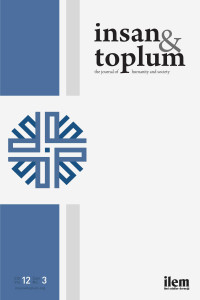Beyond the Gas Trade: The Structural Determinants of Russo-Turkish Relations
Soğuk savaş sonrası dönemde Rusya ve Türkiye özellikle Mavi Akım denizaltı boru hattı üzerinden ithal edilen doğalgaz hususunda birbirleri ile yakın ticari partnerler haline gelmiştir. Bu tür bir ticari ortaklık ve ekonomik iç bağımlılık üst siyasete kadar uzanan bir iyimserlik ve tabiri caizse hoşnutluk halini ortaya çıkarmıştır. Birçok analizci Kafkaslar, Orta Doğu, Orta Asya ve başka birçok yerde ekonomik büyüme ve giderek artan enerji ortaklıkları sebebiyle karışıklık ve iç savaşların gitgide azalacağı yönünde sonuçlar çıkarmışlardır. Ayrıca bu tartışma, Türkiye büyüyen endüstri sektörünün devamlılığını sağlayacak yeterli miktarda ucuz doğalgaz bulabildiği ve Rusya yeni enerji ithalatları ile hasılatını büyütebildiği takdirde her iki tarafın da kazançlı çıktığı bir durum ortaya çıkarmıştır. Ancak stratejik çıkarlar bağlamında bir ortaklık için bu yeterli midir? Tek taraflı ve teleolojik argümanlar öne sürülmeye devam ettiği müddetçe ekonomik bağımlılığın anlamına dair klasik tartışmalar sürekli önümüze gelmeye devam edecektir. Rus-Türk kumarının yapısal politik-stratejik etmenleri burada göz ardı edilebilir mi? İki gücün Kafkaslar, Ukrayna ve Suriye meselesindeki politikaları savaş sebeplerinin –veya stratejik düşmanlığın- materyal çıkarlar arasından doğduğuna işaret etmektedir.
Anahtar Kelimeler:
Rus-Türk ilişkileri, enerji ticareti, doğalgaz, mavi akım, ekonomik bağımlılık
Beyond the Gas Trade: The Structural Determinants of Russo-Turkish Relations
The post-Cold War era has seen Russia and Turkey become close trading partners, mainly with regard to gas imported via the undersea Blue Stream pipeline. Such trade cooperation and the ensuing economic interdependence have created euphoria and optimism that this will spill-over to high politics. Many analysts have concluded that, at the least, the prospect of economic growth and increasing energy cooperation will cause political and strategic disputes in the Caucasus, the Middle East, Central Asia and elsewhere to wane. Moreover, the debate is referred to as a ‘win-win’ situation, for Turkey could find adequate quantities of cheap natural gas to sustain its flourishing industrial sector and Russia could increase its revenues via new energy exports. However, is this enough for a convergence in terms of strategic interests? The classic debate on the meaning of economic interdependence returns again and again as long as monolithic and teleological arguments keep being made. Can structural the political-strategic determinants of the Russo-Turkish energy gamble be neglected? The two powers’ policies in the Caucasus, Ukraine and Syria seem to indicate that causes of war – or strategic antagonism – arise beyond materialist convergences.
Keywords:
Russo-Turkish Relations, energy trade, natural gas, blue stream, economic interdependence,
___
- Akkuyu, Nükleer A.Ş. (2011). Proje hakkında. Retrieved from: http://www.akkunpp.com/proje-hakkinda
- Alkan, S. (2015). Erdoğan submits Ankara’s finalized report on abuses against Crimean Tatars to Putin. Retrieved from: http://www.dailysabah.com/politics/2015/06/15/erdogan submits-ankaras-finalized-report-on-abusesagainst-crimean-tatars-to-putin
- Art, R. (1996). Why Western Europe needs the United States and NATO. Political Science Quarterly, 111 (1), 1–39.
- Bacik, G. (2001). The Blue Stream project, energy cooperation and conflicting interests. Turkish Studies, 2 (2), 85–93.
- Baldwin, D. A. (1985). Economic statecraft. New Jersey: Princeton University Press.
- Baran, Z. (2004). Turkey and the Caucasus. In İ. Bal (Ed.), Turkish foreign policy in post-Cold War era (pp. 269–289). Boca Raton: Brown Walker Press.
- Çelik, Y. (1999). Contemporary Turkish foreign policy. London: Praeger.
- Crimea: Historical society (2015). Population of Crimea. Retrieved from: http://www.crimeahistory.org/population-of-crimea/
- Davutoğlu, A. (1998). The clash of interests: An explanation of the world (dis)order. Perceptions: Journal of International Affairs, 2 (4), 107–130.
- Ernst & Young (2013). Turkey 2013: The shift, the growth and the promise. Ernst & Young’s attractiveness survey.
- Gartzke, E. and Weisiger, A. (2013). Permanent friends? Dynamic difference and the democratic peace. International Studies Quarterly, 57 (1), 1–15.
- Gilpin, R. (1981). War and change in world politics. Cambridge: Cambridge University Press.
- Glaser, C.L. (1997). The security dilemma revisited. World Politics, 50 (1), 171–201.
- Jervis, R. (1978). Cooperation under the security dilemma. World Politics, 30 (2), 167–214.
- Jervis, R. (1999). Realism, neoliberalism and cooperation: Understanding the debate. International Security, 24 (1), 42–63.
- ISSN: 2146-7099
- Başlangıç: 2011
- Yayıncı: İlmi Etüdler Derneği
Sayıdaki Diğer Makaleler
Akl-ı Selimden Zevk-i Selime: “Edebiyat” Kelimesinin İlk Kullanımı ve Anlamı
Polanyi’nin Modern İktisatın İnsan Anlayışına Eleştirileri
Perception of Society and Democracy in Ottoman Liberal and Socialist Thought
Türk Çayına Süt Katmak: Londra’da Yaşayan Türkiyeli Göçmenlerin Gündelik Hayatları
